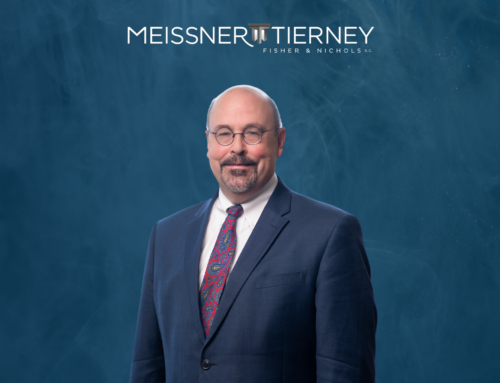Attorney Tom Nichols, President and Shareholder at Meissner Tierney Fisher & Nichols S.C. and Chairman of the Board of Advisors for the S Corporation Association, testified at a hearing held by the U.S. House of Representatives Committee on Small Business entitled “Tax Extenders and Small Businesses as Employers of Choice.”
Tom’s Capitol Hill testimony first emphasized the important role that pass-through and other closely held businesses play in employment and job creation. In this regard, he cited a number of authorities, including the Kaufman Foundation which has determined that “without startups, there would be no net job growth in the U.S. economy.”
Tom described a number of specific actions that Congress could take this month to ensure that small businesses (generally defined as those having fewer than 500 employees) continue in their critical job-creating role. First on the list was making permanent those of the growing list of “extenders” (tax provisions that Congress enacts only for limited periods in order to avoid having to account for their revenue impact for the full 10-year budget cycle) that represent fundamentally sound tax policy. At a minimum, Congress should enact such extensions in advance, rather than well into the tax year as it has for the past several years.
In his oral testimony, Tom addressed the importance of ending the extender roller coaster, “There’s no question that it has a dampening effect. It’s the equivalent of being told you might have cancer. Yes, technically you can do everything you could’ve done before, but at the end of the day you don’t really know and it’s going to slow down your long-term thinking.”
As noted in Tom’s oral testimony, the most far-reaching of these provisions is the limit on section 179 “expensing.” In fact, even in December of this year, businesses still don’t know whether they can expense (i.e., deduct currently) $500,000 (or only $25,000!!) of the capital expenditures that these provisions are intended to incentivize. The same is true with respect to similar incentives for qualified leasehold property, qualified restaurant property and qualified retail improvements, as well as fifty percent bonus depreciation.
Uncertainty with respect to another “extender” provision, the shorter, five-year holding period for the S Corporation built-in gains tax is similarly debilitating. As Tom noted in his written testimony:
Delaying confirmation of the five year built-in gains tax period has similarly destructive consequences. In the past several years, small business owners have asked me repeatedly whether the five-year or ten-year period will apply. The only response I could give them is that the final built-in gains period will ‘probably’ be five years, but that they can’t count on it.
This has created a number of excruciatingly difficult situations for my clients. For example, several of my farming clients were attempting to sell agricultural land – either to raise capital or to finance their pending retirement – while farmland prices were at their peak. Unfortunately, for those in the critical 6 to 10-year ‘limbo’ period, this uncertainty constituted a huge stumbling block, and now it appears that the optimal time for selling is gone.
As with expensing, a five-year period for the built-in gains tax is well supported by policy considerations. The built-in gains tax was originally enacted in the Tax Reform Act of 1986 and was intended to prevent C corporations from converting to S Corporation status and selling some or all of their business subject only to the single-tax S Corporation regime. To be honest, I have never understood why paying only one tax upon the sale of a business was considered a loophole to be closed. Regardless, it is generally recognized that a ten-year waiting period is much longer than necessary in order to achieve the initial policy goal. Given the uncertainties and vagaries of conducting business, business owners are extremely unlikely to elect S Corporation status with concrete plans to sell after waiting for a period of five or more years.
Tom also described a questionable position that the IRS has taken under the Affordable Care Act that has a substantial impact on employers, especially those with fewer than 50 employees. The Service has announced that Health Reimbursement Arrangements (HRAs) and other arrangements where employers reimburse employees for premiums on health insurance purchased in the individual market somehow run afoul of the market reform provisions of the Affordable Care Act. As noted in Tom’s written testimony,
The explanation given [by the IRS] is that such plans violate the “no annual limit” and “preventive services” Affordable Care Act requirements, notwithstanding the fact that the individual policies so procured do and are required to comply in full with those (and all other) Affordable Care Act requirements. The weakness of this position is further belied by the fact that, in the same announcement, the Service took the position that employer HRAs could reimburse employees for premiums on coverage offered by the same or even other employers. The bottom line is that an employer can’t reimburse his or her employees for premiums for insurance purchased in the individual market, but the employer can reimburse them for the cost of coverage provided by the employer or by other employers.
This contorted position is particularly burdensome for small, closely held businesses who simply are not in a position to establish self-insured plans that can be tailored to meet employer and employee needs. As a consequence, a disproporti onate number of our smaller clients have been negatively impacted. One client of ours had a health insurance plan that differed from what many of his employees preferred. In order to accommodate their concerns, he had established a long-standing HRA that provided generous reimbursement for premiums on health insurance policies selected by the individual employees. Both he and his employees liked this plan, but unfortunately, under the above-described IRS interpretation, they couldn’t keep it.
I have been surprised by how widespread the negative reaction to this IRS position has been. In fact, without specifically raising this issue, I’ve been contacted by practitioners, both in my capacity as Chairman of the Board of Advisors for the S Corporation Association as well as in my capacity as a member of the Board of Directors of the Business Law Section of the State Bar of Wisconsin, questioning how the Service could have reached such a result. At the national level, the National Federation of Independent Business has conducted research on how prevalent this problem is. NFIB concluded that currently, 16 percent of small employers are in violation of the new rule.’
The penalties for running afoul of this questionable position are draconian. Having an HRA that allegedly violates the Affordable Care Act “no annual limit” and “preventive services” requirements results in a penalty of $100 per day per employee ($36,500 per year). Thus, a small employer with only 10 employees covered by his HRA could be facing a penalty of $365,000 in any given year, all for just reimbursing those employees for the premiums on policies that are fully compliant with those and all other Affordable Care Act requirements. Such awkward and onerous requirements and penalties unavoidably serve to dampen entrepreneurial spirit for small business owners who cannot afford to hire and maintain expensive compliance departments.
Fortunately, this problem is starting to be recognized, and there is currently bipartisan legislation in both the House and the Senate to correct this interpretation. Small Business Healthcare Relief Act, H.R. 2911, 114th Cong. (1st Sess. 2015); Small Business Healthcare Relief Act, S. 1697, 114th Cong. (1st Sess. 2015).
Tom’s full written testimony can also be downloaded here. This testimony also covers other tax issues that constitute unnecessary impediments to the successful operation of closely held businesses, including section 409A, which needlessly complicates Phantom Stock Plans and other deferred compensation arrangements without any significant fundamental policy or revenue benefits.
Tom Nichols dedicates a substantial portion of his practice to both business entity law (e.g., corporations, partnerships, LLCs) and tax law (e.g. income tax, self-employment tax, estate tax) as well as other considerations involved in structuring and running business enterprises. He can be reached at tjn@mtfn.com, or by calling (414) 273-1300.





